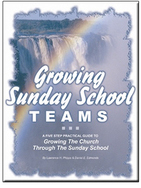In Paul’s letter to the Romans, Chapter 6, he states in verse 17, “But thanks be to God, that you who were once slaves of sin have become obedient from the heart to the standard of teaching to which you were committed” (ESV; emphasis added). It seems that Paul had a type of “New Believers” course for converts. As I was discussing this idea with my Bible Fellowship group this past Sunday, I directed the conversation to discuss our personal “standards of teaching.” The exact question was, “What are your standards of teaching you live by?” As we are looking at the New Year, this is a great time to evaluate our standards. One area where I believe we can all do better relates to our standard of personal development. I believe this falls into the category of a standard of teaching, as we are to be lifelong learners.
I like to encourage directors and teachers to develop a growth plan. I include a number of items related to working as an educational team in the life of the church; your participation on this team is important as the disciplers of the church.
- Annually, attend a Sunday School or Church Growth Conference. Many conferences are now being offered online via live streaming or even for download after the event.
 Annually, attend a church-focused training event coordinated specifically for your church. Many churches provide an annual training event where the pastor and or/minister of education equips the leaders within the context of your specific church needs. This is a great way to stay in touch with what your pastoral leadership team sees as the needs of the church.
Annually, attend a church-focused training event coordinated specifically for your church. Many churches provide an annual training event where the pastor and or/minister of education equips the leaders within the context of your specific church needs. This is a great way to stay in touch with what your pastoral leadership team sees as the needs of the church.- Monthly, meet with church Sunday School Director, pastor, and/or minister of education to discuss any issues with curriculum, inform them about needs within your small group, etc. This communication times helps the pastoral leadership team stay “in touch” with what is happening and know better how they can support and provide ministry within the church.
I also think we need to have our personal study practices challenged and in place. So here are some thoughts for 2012:
- Read through the Bible. You may not do this each year; but you might choose to do so. I recommend finding different methods of doing this. Zondervan has a great study, “The Bible in 90 Days.” This is a real challenge.
- Read a doctrinal study. Make certain you know why you believe what you believe. This can be done through a number of studies, I like Ken Hemphill’s study from Auxano Press, “Core Convictions” which essentially helps provide you a systematic theology of your doctrine.
- Read a book on evangelism to remind yourself of the great need to keep the Gospel message in the forefront of your class and make certain you are sharing your faith through your teaching. Try “SPLASH,” also from Auxano Press.
- Read a spiritual gifts book. My Bible Fellowship is called Gateway. The word “GATE” is an acronym for Gifts And Talents Exercised. We constantly remind our members to serve, and you might also. Maybe they need a little assistance. Studying up on spiritual gifts can help you answer questions as you are encouraging members to use what God has gifted them with.
There are training sites you can go to for continued education as well. Your state convention might have something. At the Southern Baptists of Texas Convention, we have launched a Leadership App. Simply go to itunes and search SBTC. The App name is “iLead.” LifeWay offers online training through: www.lifeway.com/onlinetraining





